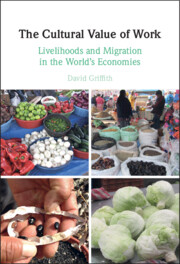Book contents
- The Cultural Value of Work
- The Cultural Value of Work
- Copyright page
- Dedication
- Contents
- Figure
- Tables
- Preface
- Acknowledgments
- Introduction
- Part I Labor in Ethnohistorical Settings
- Part II Values of Forms of Labor
- 4 The Value of Reproductive Labor
- 5 Domestic Economics I
- 6 Domestic Economics II
- 7 Cultural Labor in the Migration Economy
- Part III Work and Labor in Economic and Anthropological Theory
- Appendix A A Note on the Qualifications of the Author
- References
- Index
6 - Domestic Economics II
from Part II - Values of Forms of Labor
Published online by Cambridge University Press: 14 July 2022
- The Cultural Value of Work
- The Cultural Value of Work
- Copyright page
- Dedication
- Contents
- Figure
- Tables
- Preface
- Acknowledgments
- Introduction
- Part I Labor in Ethnohistorical Settings
- Part II Values of Forms of Labor
- 4 The Value of Reproductive Labor
- 5 Domestic Economics I
- 6 Domestic Economics II
- 7 Cultural Labor in the Migration Economy
- Part III Work and Labor in Economic and Anthropological Theory
- Appendix A A Note on the Qualifications of the Author
- References
- Index
Summary
This chapter shifts from a focus on the domestic economics of peasant farming to the domestic economics of artisanal fishing in Latin America and commercial fishing in the Gulf of Mexico. After a brief profile of Las Brisas, a fishing community in Mexico that, like Mantiox de Dios, also sends guest workers abroad, the narrative shifts to a focus on changing property relations in Gulf of Mexico fisheries and how those changes have affected methods of labor exploitation on commercial fishing vessels. It considers how the scholarship on forms of exploitation among peasants applies to contemporary Gulf of Mexico fishing crews, who complain of being transformed from captains and crew who shared the catch more or less equally with vessel owners to “sharecroppers” responsible for paying the leasing and administrative rents required to enter the fishery.
Keywords
- Type
- Chapter
- Information
- The Cultural Value of WorkLivelihoods and Migration in the World's Economies, pp. 123 - 145Publisher: Cambridge University PressPrint publication year: 2022

